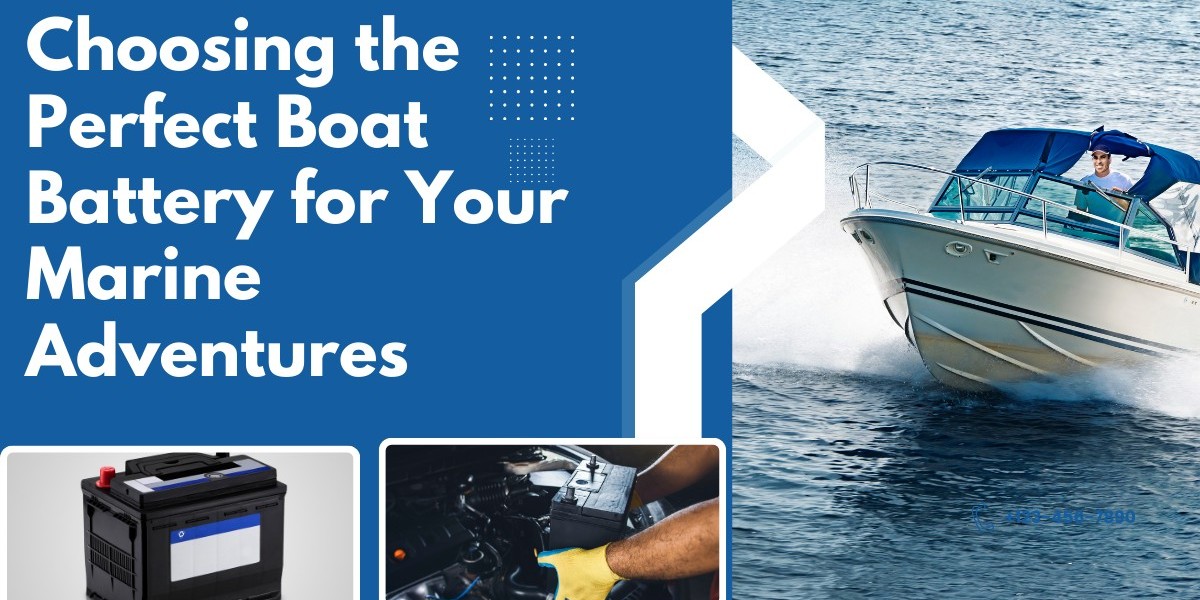In the world of boating, the boat battery plays a critical role, providing reliable power for everything from starting the engine to running essential electronics like lights, GPS systems, and even the bilge pump. Without a dependable boat battery, your time on the water could be cut short, leaving you stranded. This guide will help you understand the various aspects of boat batteries, ensuring you make the best choice for your vessel while keeping it running smoothly.
Understanding Boat Batteries: Why They’re Essential
A boat battery is unlike your typical car battery. While both provide power, the demands on a boat battery are more diverse. Not only does it need to crank up the engine, but it must also maintain power for onboard electronics and devices, some of which need consistent, long-lasting energy. This is where the distinction between starting batteries and deep-cycle batteries comes into play.
- Starting Batteries: These batteries deliver a powerful burst of energy in a short period to start your boat's engine.
- Deep-Cycle Batteries: These are designed to deliver a lower, steady amount of power over an extended period, ideal for operating electronics.
Depending on your boating habits, you may need both types or opt for a hybrid version. But knowing the difference will help you avoid unnecessary trouble when you're out on the water.
Types of Boat Batteries - Choosing the Right One for Your Vessel
There are three main types of boat batteries: lead-acid, AGM (Absorbed Glass Mat), and lithium-ion. Each has its pros and cons, which you should consider before making a purchase.
Lead-Acid Batteries: These are the most common and affordable boat batteries. They're reliable but require regular maintenance, such as topping up with distilled water. They are heavy and can leak acid if damaged.
AGM Batteries: These are sealed, maintenance-free batteries that are more durable and efficient than lead-acid batteries. They handle vibrations and rough waters well, which is an important consideration for frequent boaters. AGM batteries also have a longer lifespan.
Lithium-Ion Batteries: The cutting edge of marine batteries, lithium-ion batteries are lightweight, hold a charge much longer, and can handle more charge cycles. However, they are also the most expensive.
Choosing the right boat battery is crucial to ensure longevity, efficiency, and safety on your water adventures.
Battery Maintenance Tips - Keep Your Boat Running Smoothly
Once you’ve invested in a quality boat battery, you want to ensure it lasts as long as possible. Proper maintenance will prevent battery failure and save you from expensive replacements. Follow these simple steps:
Regular Charging: A boat battery should be kept at full charge when not in use. Leaving it discharged can reduce its lifespan. Consider using a smart charger that adjusts the charging rate based on the battery's needs.
Clean the Terminals: Corrosion can build up on battery terminals, leading to poor performance or failure. Clean the terminals regularly with a wire brush and a solution of baking soda and water.
Store Properly: During off-season storage, remove the battery from your boat and store it in a cool, dry place. Ensure it remains charged during the off-season by charging it every few months.
Check Water Levels (For Lead-Acid Batteries): If you use a lead-acid boat battery, monitor the water levels and refill with distilled water as needed.
Inspect for Damage: Always inspect the battery casing for cracks, bulging, or any signs of leaking. Any damage should be addressed immediately to avoid further problems.
Regular maintenance is a small investment of time that will pay off by extending the life of your boat battery.
How Long Does a Boat Battery Last?
The lifespan of a boat battery depends on several factors, including the type of battery, usage, and maintenance. On average:
- Lead-Acid Batteries: 3 to 5 years
- AGM Batteries: 4 to 6 years
- Lithium-Ion Batteries: Up to 10 years
By choosing the right battery for your needs and taking proper care of it, you can maximize its lifespan and avoid unexpected failures.
Boat Battery Sizing - How to Choose the Correct Size
Choosing the right size boat battery is essential to ensure your battery can meet the energy demands of your boat. Sizing refers to the capacity of the battery, usually measured in ampere-hours (Ah). To calculate the right size, add up the amperage requirements of all your onboard devices, including lights, GPS, radio, and other electronics.
Here’s a simple example:
- If your devices consume a total of 50 amps per hour, and you plan to run them for 10 hours, you need a battery that can provide 500 Ah (50 amps x 10 hours).
Additionally, it's wise to choose a boat battery that offers more capacity than you think you’ll need to cover any unexpected energy demands. Remember, deep-cycle batteries should not be fully discharged, so choose a capacity that covers your needs while allowing for some buffer.
Signs Your Boat Battery Needs Replacing
All batteries eventually need replacing, and knowing the signs of a failing boat battery can save you from being stranded out on the water. Here are some key indicators:
- Sluggish Engine Start: If your engine takes longer than usual to start or doesn't start at all, your boat battery may be losing its charge.
- Dim Electronics: Lights flickering or dimming may be a sign that your battery is not providing enough power.
- Corrosion: Excessive corrosion on the battery terminals can indicate that your battery is nearing the end of its life.
- Age: If your boat battery is reaching the end of its typical lifespan (as mentioned earlier), it might be time to replace it before it fails.
Regularly checking your battery and replacing it when necessary is essential for safe and smooth boating.
Environmental Impact - Disposing of Boat Batteries Safely
Boat batteries, like all batteries, contain hazardous chemicals that should never be disposed of in regular household trash. Lead, acid, and lithium are harmful to the environment and human health if not disposed of properly. To safely dispose of your old boat battery, take it to a certified recycling center or a marine shop that offers battery recycling services.
Recycling is not only the responsible thing to do but is often legally required. Many countries have strict laws on the disposal of lead-acid and lithium batteries due to their environmental impact.
Comparing Boat Battery Brands - Which One Should You Trust?
With so many brands on the market, choosing the right boat battery can feel overwhelming. Here are a few well-known and trusted brands in the boating industry:
- Optima Batteries: Known for their high-performance AGM batteries, Optima offers excellent cranking power and long-lasting durability.
- Interstate Batteries: This brand is a popular choice for both marine and automotive use, offering reliable power and a wide range of options.
- Battle Born Batteries: Specializing in lithium-ion batteries, Battle Born is a top choice for boaters looking for lightweight, long-lasting, and eco-friendly power solutions.
- Vmax Tanks: Offering deep-cycle AGM batteries, Vmax Tanks is a good choice for boaters who prioritize durability and performance.
Before purchasing, be sure to compare the features, warranties, and customer reviews of these brands to find the best boat battery for your needs.
FAQs
What’s the difference between a boat battery and a car battery?
A boat battery is designed to provide power for longer periods and operate in harsher conditions, while a car battery delivers a quick burst of energy to start the engine.
How do I know what size boat battery I need?
Calculate the total energy demand of your boat's electronics in amp-hours (Ah), then choose a battery with enough capacity to meet those needs without fully discharging.
Can I use a car battery in my boat?
While technically possible, car batteries aren’t built for the marine environment or extended energy demands, so it’s best to use a proper boat battery.
How often should I replace my boat battery?
Most boat batteries last between 3 to 10 years, depending on the type and how well they are maintained.
Do I need a deep-cycle battery for my boat?
If you have electronics that need to run while the engine is off, a deep-cycle boat battery is essential. These batteries provide steady power for extended periods.
What is the best way to store a boat battery during winter?
Remove the battery from the boat, charge it fully, and store it in a cool, dry place. Charge it periodically to maintain its lifespan.
Conclusion
A boat battery is an essential component of your vessel, providing power for everything from the engine to critical electronics. Understanding the different types, maintenance tips, and how to choose the right battery size ensures you have a reliable power source for your adventures. Taking care of your boat battery will help you enjoy worry-free time on the water, whether you're fishing, cruising, or engaging in water sports.







